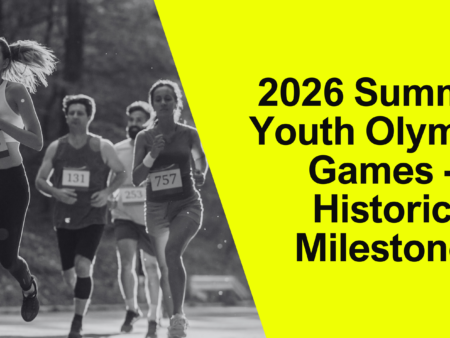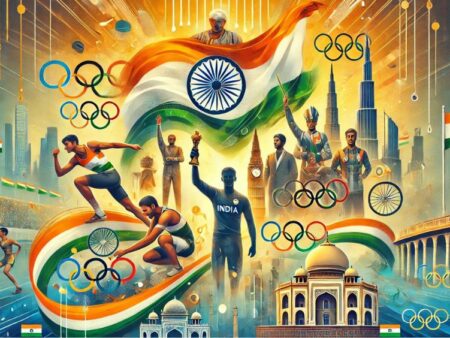Since the Olympics is a world sporting activity meant to embrace talents in athletic activities, it has a significant impact on sporting development in the world. In India, especially in the rural areas, factors that come with the Olympics are monumental when thinking of sports and nurturing young talents. This article explores the Olympic role in converting sports in the rural regions of India concerning the basic developments of models in infrastructure, grassroots, and government support.
Olympics and Rural Sports
The Olympics have been an inspiration to take up rural sporting activity in the country of India. Despite the early prominence of metro cities in the Indian sports scenario, the Olympics have brought out talent from all the villages. Sports personalities such as P.V. Sindhu, Neeraj Chopra, and Mirabai Chanu have set up examples and induced sociability in today’s young persons in villages regarding sports as a worthy and successful career. The fact that the Olympics accepts all the contestants increases the motivation of rural athletes to compete for India in the World.
Sporting Facilities in Rural Areas of India
The great barrier that authorities faced while developing sports in the rural areas of India was the absence of evident construction. However, the desire to host the Olympics has influenced the improvement of . Lately, the government and private organizations have embarked on constructing such amenities commonly known as modern human settlements, including training centers, playgrounds, and stadiums in the villages. Initiatives like Khelo India have to develop talent from the grassroots level and offer opportunities for exposure to talented rural kids and expose them to standard facilities and training.
Grassroots Sports Development
Grassroots sports have a major role to play in building a successful sports culture, and the Olympics have influenced this area in rural Maharashtra. The grassroots program is designed in such a way that an early talent has to be identified, trained in a particular format, and then given a platform from which he/she can compete. As much as these programs help to sharpen the talent of these rural athletes, they also help to develop such character appearances as discipline, teamwork, and tenacity, and such qualities are especially useful not only in sports but also in life.
The Impact of the Olympic Games on Indian Villages
Thus, the impact of the Olympics on Indian villages is multifold. The event has served to popularize the need for sports in the development of healthy communities and pride in one’s country. Villagers nowadays consider the Olympic victories of rural athletes as special examples, and this is why the number of people interested in sports has grown higher. Notably, Olympic success has gone a long way in getting rid of social barriers such as those affecting women in rural societies where females and even women in rural areas were encouraged to pursue sports and fight stereotypes.
Rural Talent in the Olympics
Hundreds of Olympic talents have been discovered in small towns and villages, and India is no exception. Max fever: Neeraj Chopra, the recent first Indian athlete to start the gold medal in athletic events, is one such rural talent that has been molded into a champion. Likewise, Mirabai Chanu, the Olympic medalist in weightlifting, hails from a village in Manipur. These success stories serve as proof of the emergence of the rural athletic team from the barrens and how these talents need to be honed properly by giving them the right tools and equipment.
Sport as Outlet to Education in Rural Schools
Sport education for children in rural areas: an important factor as to the production of future Olympians. The involvement of sports in school makes the young ones develop an interest in sports and also be classified according to their talent through the school terms that they undergo. Such programs as the Fit India Movement have caused a focus on extending sports education and physical fitness among children of rural school age, making them more developed in their overall growth.
Government Schemes for Farming: An Overview
The Indian government has ensured the provision of rural sports facilities in many ways. Some of the scholarships are the Khelo India Scheme and the SAI and its Government-with-Anime are to develop financial support, training and facilities in rural sports people. Besides raising performers for national and international sporting events, such measures also develop a viable sporting culture in the countryside. Talent hunt scholarships, sponsorships, and the grassroots level’s response to the urban-rural gap also encourage participation.
A review of Olympic success stories in India
India’s Olympic success story is directly related to the rural sports success stories. The success of sportspersons like Dutee Chand, Hima Das, and Bajrang Punia has also revealed the huge untapped talent in the rural belt. These athletes are now those people who showed that success in the international arena is possible with proper training and commitment, regardless of one’s origin.
This paper seeks to tackle the subject of empowerment through sports
The improvement of youths through sports is one of the more tangible aspects from which the Olympics have impacted rural India. Sport is not only a physical exercise, but it is also an opportunity to develop important life skills, including leadership, teamwork, and per se. Sports are an unparalleled means to get out of poverty and make a better life for the rural youth who otherwise are left with no hope.
RIO Outstanding Achievement
The given focus on the rural areas of India sports opportunities have a ripple effect. Thanks to the increased funding from authorities and private contributors, as well as the accomplishments of rural athletes in the Olympics, recently more attention has been paid to building the sports at the village level. Right from talent identification camps to grassroots tournaments, the avenues guarantee that no talent goes unrewarded.
Conclusion
Thus, it can be concluded that the consequences of Olympic development on sports promotion in rural India are unquestionable. This paper has argued that through instrumentalization of sports by targeting rural youth, enhancing physical infrastructure, and promoting bottom-up development, the Olympics have contributed immensely towards the enhancement of sports facilities in Indian villages. The nation demands improved sports culture and increased opportunities for academic athletes as more rural athletes extract themselves into the limelight. If focused attempts and consistent investment are made now, the future of rural sports in India seems more promising than ever.







